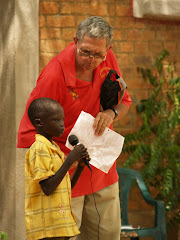This was published in the Indianapolis Star 9/20/02 JANE LICHTENBERG Imagine getting up on Sunday morning to go to church, but finding no member of the clergy to hold services. Imagine going to school in a thatched-roof, dirt-floor structure, with no electricity, no computers, few teachers. No mailbox down the street, no modern bathrooms, no car to take you to the store or work. Imagine holding a sick child in your arms, but having no doctor to offer relief from his pain. This is the everyday reality for Father Michael Barton, a Comboni missionary who has spent 18 years in southern Sudan befriending and teaching people who have less than even the poorest Americans. Sudan has been torn apart by civil war, which began in 1985 when the Khartoum government tried to impose Islamic law on the south. Arab-Muslim government forces from the north battle the Sudan People's Liberation Army in the south, where the tribal people are Christian or animist. The SPLA is fighting for a secular state and equal opportunity for all, the Catholic priest explains. Though the United States has been trying to broker a peace settlement in a conflict that has left more than 2 million dead and 4.5 million refugees, negotiations are difficult and great suspicion exists on both sides, special envoy and former senator John Danforth reports. Large oil reserves in the south complicate the situation. Barton, 54, who grew up on the Indianapolis Eastside and still has family here, returned home five months ago for a sabbatical; he'll head back to Sudan next Friday. He says all Christian missionaries were expelled from southern Sudan in 1964 and did not return until the late 1970s. After studying for the priesthood in Italy, in 1978 he was assigned to the Archdiocese of Juba, the largest southern city, where he did pastoral work among four Bari-speaking tribes spread over 150 villages. When the civil war began in 1985, rebels tore apart his mission. For the past nine years, he and a pastoral team of missionary sisters have worked with members of the Dinka tribe in Rumbek, where they started a school for 150 students in the first and second grades. When Father Mike left last spring, he turned the school over to local Sudanese. By that time it had grown to more than 2,000, including eight primary grades and a four-year secondary school. Many of the teachers were trained by Barton and the nuns. There are no government-run schools in the south, so education is provided mainly through religious schools, he says. About 60 Catholic missionaries work in the area. The literacy rate in Sudan is only about 10 percent, "but people are understanding now that education is important," Barton says. In the early grades, lessons are taught in the Dinka language, which he speaks fluently, but English is used after the first couple of years. "When I arrived in '93, everyone was naked. Now most of them wear clothes," he says. "It's very common to see people wearing a Cincinnati Reds or an IU shirt." It's clothing that was collected by charitable organizations in the U.S., then sent to missions abroad. Barton's new assignment, in the town of Nyamllel and surrounding area in southwest Sudan, is the parish of St. Theresa, which has 67 chapels led by about 100 catechists. He says there hasn't been a priest in residence since 1964. During a brief visit there in March, he baptized a thousand people. He says Nyamllel is in an insecure area where government-supplied raiders kidnap, rape and steal livestock. When he takes up residence in the ruins of the rectory, one of his first priorities will be to improve the school, which he says now runs on "just two toes or less." He'll get water from nearby bore holes and visit parishioners on foot or bicycle. In fact, this summer he has been a familiar sight riding his bicycle all over Indianapolis and to Cincinnati, Notre Dame and southern Indiana. What inspired him to become a missionary? "Seeing the lives led by other priests; a desire that other peoples hear the Christian message, and certainly the adventure of it," he says. "There's the loneliness, the hunger of it. Sometimes there isn't even salt. Tea and sugar are rare. "But once I was there, I saw the need. We started with nothing. We give the parishioners the means; then it's in their hands," he explains. In an interview on National Public Radio this week, first lady Laura Bush recalled the horror of Sept. 11 and noted that Americans have much to be thankful for. It's easy to forget we have been blessed with riches beyond imagining by most Sudanese, who live daily with privation and the threat of violence. The work of Comboni missionaries, who number more than 3,000 religious and lay persons throughout the world, is supported by contributions. To help with Father Barton's ministry, donations can be sent to Camboni Missionaries, 1312 Nagel Rd., Cincinnati, Ohio 45255. Attention: Nyamllel. |
Monday, November 19, 2007
Priest on a mission to help war-weary people of Sudan
Subscribe to:
Post Comments (Atom)

No comments:
Post a Comment